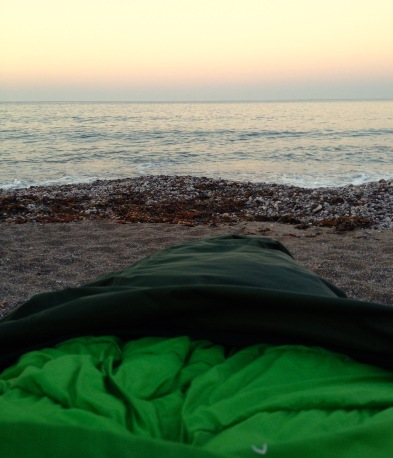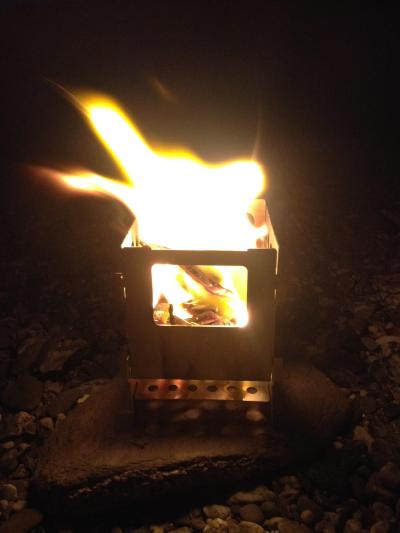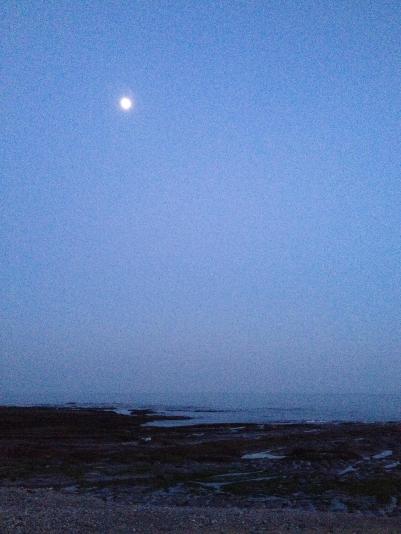Sunday 7th May 2017
Bivvy Night
It’s 10.10 at night and I’m sitting on the beach in the dark on my own. I’m propped against a rock, my sleeping bag and roll mat are stretched out in front. A driftwood fire is warming my legs, occasionally the smoke swirls into my eyes.
So what does it feel like to be doing your first solo wild bivvy?
Funnily enough I’m not nervous. I always thought I would be, especially as a woman. Being afraid of being vulnerable always meant I ruled out heading to a wild space, to sleep, without a tent, all alone.
I was nervous earlier – walking the shore with a substantial rucksack as evening drew closer felt very exposed. You think everyone knows what you’re going to do, however much you try to look like you’re on a training hike.
But I’d set out calling this a ‘bivvy reconnaissance’. A recce with full kit, but still a recce – if I didn’t want to stay I’d head home: recce done (tick), not bivvy failed (cross).
So I found myself a stretch of beach where I was tucked completely out of sight. And as I sat there on my rock and the sun got lower, I slowly adjusted to the thought of not going home.
I became more and more comfortable – I could envisage what it would be like to stay. And suddenly I was staying; it was too dark to go back – it felt more dangerous to go back. And I was happy with that.
Now, although the sun set 90 minutes ago, it’s curiously light – ahead in a completely clear sky hangs an almost full moon, with a bright planet just below and to the right.
Odd jumping sand creatures are pinging off my kit – I’m determinedly not thinking about them jumping into my bivvy bag once I’m asleep. But if that’s now the biggest of my worries – I can cope with that. Otherwise it’s still; serene. An owl is hooting. I can hear the waves, see the moon, smell the burnt-out fire. Time to sleep.
Monday 8th May 2017
Bivvy Dawn
It’s now about 6.15am. The sun has risen over the headland and is warm on my back. I have a mug of ridiculously strong coffee brewed over a driftwood fire*. The remains of the French bread that was, with cheese, last night’s supper, still tastes good for breakfast. Six oystercatchers have just given a noisy, celebratory fly-past.
I’m thinking back to the night – how I kept waking to peep at the clear sky through the bivvy hood. Each time the moon had tracked to the right taking that planet** with it. Another time the sound of waves woke me – much nearer now. I watched them warily for a while – the piece of advice most people gave me (although I was already onto this one) was to make sure I slept above the tide line …

So how do I feel?
Having done the thing that scared me and made me feel vulnerable? Where I’d let learned fears and perception win out over reality? (the thing that prompted My Solo Wild Bivvy Pledge)
I’m not stoked, not punching the air. But somehow I’m deeply happy – I keep giggling to myself.
I’m relaxed, quietly empowered and somehow more sure. Of me.
I’m also incredibly tired – I really didn’t sleep much at all.
But I’m considering the possibilities and the potential.
And I’m thinking of all the mornings that can be like this.
So what have I learned?
That there are pretty much always people who can provide inspiration and information. On this that came via Phoebe Smith, author of Extreme Sleeps (essential reading). And via an encounter at Women’s Adventure Expo with Erin Bastian and Anna Blackwell – awesome adventurers all.
And that (thank you!) so many people will give support when you do the thing that scares you.
So much so that on a solo bivvy, although there’s no one else there, in some ways you’re not really alone.
Post bivvy
Since this first solo bivvy most reactions have been to do with being a woman and feeling vulnerable or not safe. This is tricky, and one solo bivvy down, I’m far from an expert. But my guess is sometimes you should listen to the voice that says you shouldn’t stay – that instinct might keep you safe. But sometimes I’d guess it might be ok to push through and stay on. The skill, perhaps is knowing which to do.
Sometimes being more remote will mean you’re safer from people, but it might mean you’re more at risk from the weather and the terrain. The skill, perhaps is recognising which is which.
Either way you need to do lots of research, make the right preparations and take the right precautions to stay safe***
Next Steps
I’ll continue learning from those who’ve done this before, continue wanting to GetOutside, continue listening to good advice, and continue testing myself.
Yes, sometimes I’ll pack up and come home.
But sometimes a safe space, clear skies and a driftwood fire will keep me outside.
Let me know what you do and how you get on
* A driftwood fire that was contained in a metal fire box, controlled (was on the beach, was near no flammable vegetation and had sand & water to put it out) and was completely cleared up – no bits of burnt wood, charred stone or even piles of ash. Overall, I left no trace 🙂
**I later discovered from outdoors chum Ju Lewis that this planet was in fact Jupiter
***Obviously these are judgments that must rest with you alone – this post shouldn’t be the basis of decisions (and can’t be liable or responsible for your decisions); seek specialist guidance for that.

